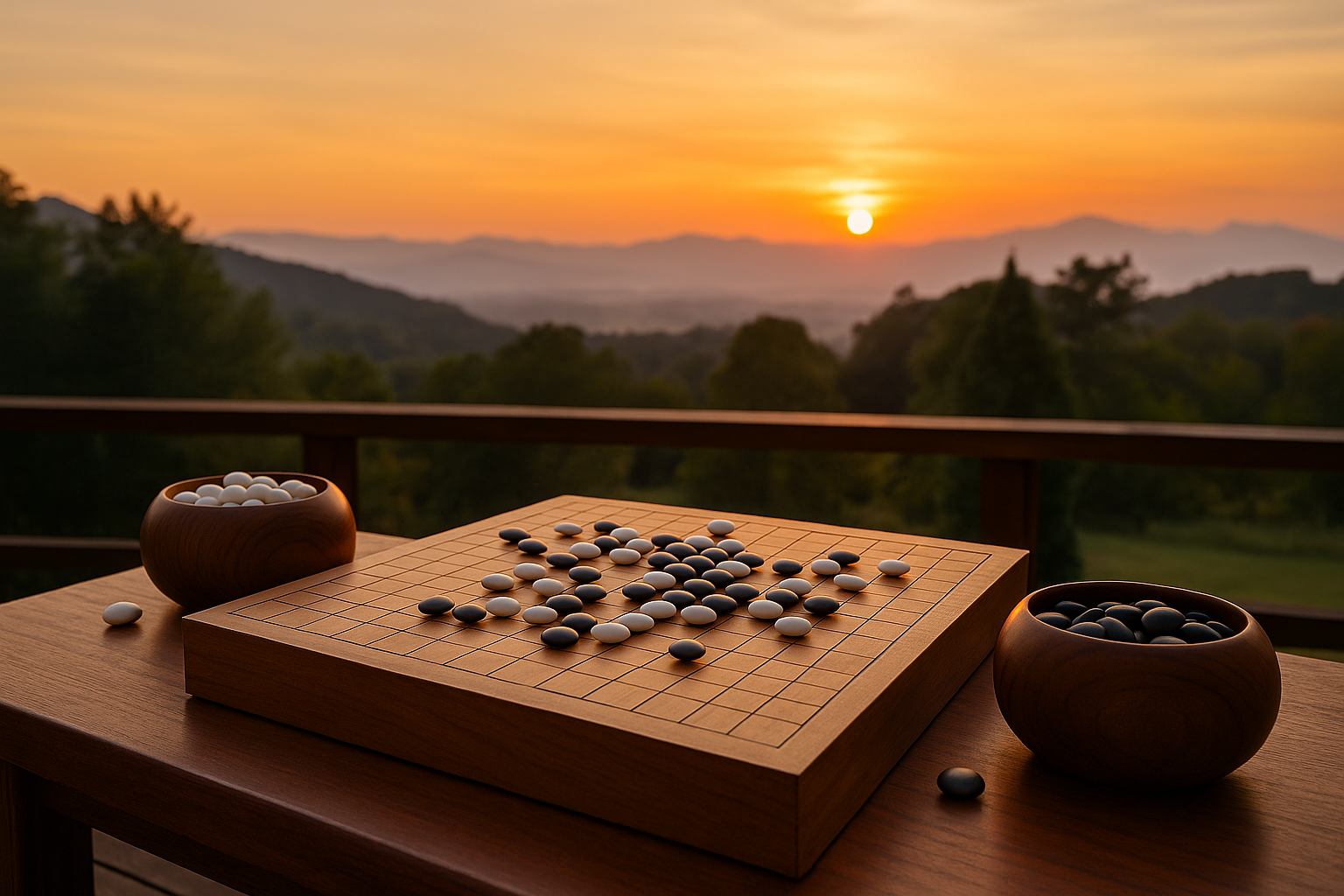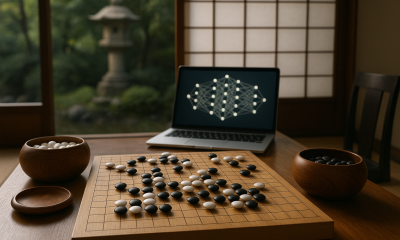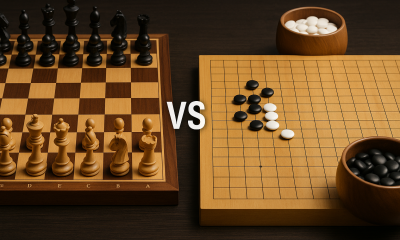News
Zen and the Art of Go: What This 4,000-Year-Old Game Teaches Modern Gamers

In an era dominated by lightning-fast shooters, sprawling open worlds, and hyper-realistic graphics, it’s easy to forget that the roots of gaming go back thousands of years. Long before esports arenas and gaming PCs, there was Go—a simple board, two colors of stones, and an infinite universe of possibilities. But Go isn’t just a game. It’s a lesson in focus, balance, and patience. It’s the original strategy simulator—and in many ways, the first “Zen” video game long before pixels existed.
Today, Go has found new life thanks to artificial intelligence, online platforms, and the renewed cultural interest in mindfulness. For modern gamers used to chaos and speed, Go offers something radically different: peace through precision. This is the story of how a 4,000-year-old game still has the power to shape how we play, think, and even live.
1. The Origins of Stillness: How Go Became the Ultimate Mind Game
Go—or weiqi in China, baduk in Korea, and igo in Japan—originated in ancient China more than 4,000 years ago. According to Encyclopaedia Britannica, it was likely invented as a tool to teach discipline and strategic thinking to young nobles. Emperors played it to sharpen their judgment. Generals used it to simulate warfare. Scholars studied it to refine concentration. To ancient Chinese philosophers, Go wasn’t about winning—it was about understanding.
Each game unfolds like a living meditation. A player must see the entire board at once—every stone placed, every space left open, every potential pattern forming. In contrast to the Western idea of conquest, Go rewards harmony. The best moves strengthen your position while respecting balance, not destruction. As the British Go Association notes, Go’s strategy mirrors Taoist and Zen concepts of flow and adaptability, where patience often overpowers aggression.
2. Simplicity and Infinity: The Design Philosophy Behind Go
On paper, Go is almost absurdly simple. The board is a 19×19 grid, and players take turns placing black or white stones on intersections. The rules can be explained in five minutes—but mastering them can take a lifetime. In fact, the number of possible games of Go exceeds the number of atoms in the observable universe.
This duality—simplicity versus infinity—is what modern designers now call “elegant design.” It’s the principle behind modern hits like PUBG, GTA V, and League of Legends: easy to learn, impossible to master. But Go did it millennia earlier.
Game designers today study Go for its perfect balance of freedom and constraint. Every stone has equal value, yet its position determines its fate. There are no dice rolls, no hidden information, no luck. The only variable is the human mind. This purity of design has made Go a favorite topic in academic studies on game theory and artificial intelligence.
3. Go as Meditation: The Zen of Strategic Thought
To play Go well is to be still. It’s a discipline of observation, patience, and timing—the same principles that underlie mindfulness and meditation. Each move is an act of focus. You cannot rush it. You cannot brute-force it. You must feel the flow of the board.
In Zen philosophy, mastery comes from awareness rather than aggression. Go expresses that perfectly. Strong players often describe entering a “no-mind” state during play—a mental zone where instinct and logic merge. Modern gamers call this the “flow state.” It’s the same trance-like focus athletes and esports professionals chase when everything clicks.
Every gamer has experienced a similar sensation—when time slows down and decisions come effortlessly. Whether you’re clutching a final round in Valorant or orchestrating a massive RTS battle in StarCraft II, you’re entering the same cognitive rhythm Go players have cultivated for millennia.
4. Lessons from Go for Modern Gamers
1. Patience Beats Reflexes
In a world of instant gratification, Go demands patience. A single mistake can unravel hours of effort, so the best players learn restraint. The same lesson applies to tactical shooters or competitive MOBAs—sometimes holding your position is stronger than pushing forward.
2. Vision Over Reaction
Go teaches players to see the whole board. Beginners often focus narrowly on one area, but experts think globally—anticipating outcomes several moves ahead. It’s the same mindset top players in Dota 2 or League of Legends use when controlling map objectives rather than chasing kills.
3. Adaptability Is Strength
Rigid plans fail in Go. Every opponent changes the shape of the board, forcing you to adapt. Modern strategy gamers face the same reality—what worked yesterday won’t always work today. The key is flexibility, not formula.
4. Respect the Opponent
In traditional Go, bowing before and after the game is a ritual of respect. The opponent isn’t an enemy but a teacher. It’s a philosophy competitive gamers could use more of in today’s often toxic online environments. Every defeat in Go, like every loss in esports, is data—a gift that refines you.
5. Seek Balance, Not Domination
Go rewards harmony, not annihilation. You win by managing space, not by destroying the opponent outright. In this way, it mirrors real life—and stands as a refreshing counterpoint to many modern games that reward unchecked aggression.
5. Go and the Rise of Artificial Intelligence
For centuries, humans were the undisputed masters of Go—until AlphaGo arrived. Developed by DeepMind, this AI system used deep neural networks and Monte Carlo tree search to defeat Lee Sedol, one of the greatest Go players in history, in 2016. It was a turning point not just for gaming, but for computer science itself.
AlphaGo’s victory wasn’t a brute-force calculation. It demonstrated creativity—making moves no human had ever considered. One of those, Move 37 in Game 2, stunned experts for its audacity and brilliance. As chronicled in the AlphaGo vs Lee Sedol match records, it changed how professionals viewed the game forever.
After AlphaGo retired, DeepMind introduced MuZero, an AI capable of learning games without being told the rules. It mastered Go, chess, and Atari purely through self-play. As DeepMind explained in their research blog, MuZero represents a new kind of intelligence—one that learns the world by observing it, just as humans do.
Open-source projects like KataGo then democratized this technology, letting players analyze games and train with AI. Today, both professionals and amateurs use AI-powered analysis to identify weaknesses, explore alternate outcomes, and sharpen intuition.
The Paradox of AI in Go
Paradoxically, AI hasn’t ruined Go—it’s revitalized it. Instead of killing creativity, it’s redefined it. Professionals now study AI games to learn new strategies that push the limits of human imagination. As Ars Technica reported, even superhuman AIs can be tricked by clever human tactics, proving that innovation is far from dead.
6. Why Go’s Philosophy Matters in Modern Gaming
Go as Mental Fitness
Modern gamers spend countless hours honing mechanical skill—but Go trains the mind differently. It’s mental fitness for strategic thinking. Like chess, it demands calculation, but unlike chess, it also rewards intuition. This balance between logic and emotion parallels what psychologists call “dual-process thinking”—the combination of fast intuition and slow reasoning that defines expert decision-making.
The Power of Minimalism
In design circles, Go is often cited as the ultimate minimalist game. Everything unnecessary has been stripped away, leaving pure interaction. It’s the same design philosophy behind indie masterpieces like Journey and Inside. These games, like Go, rely on silence, space, and subtlety to convey emotion.
Learning Through Loss
Every Go player knows this truth: losing is how you learn. There’s even a saying—“Lose your first hundred games as fast as possible.” It’s a mindset that esports players, speedrunners, and competitive gamers in every genre can embrace. Failure isn’t defeat; it’s data. The Zen masters of Go would say: the board is the mirror of your mind.
From Go Boards to Game Boards
Many of the world’s most celebrated game designers have cited Go as inspiration. The creators of Kerbal Space Program and Factorio often reference emergent complexity—the idea that simple systems create unexpected outcomes. Go was the first to embody that idea thousands of years ago.
7. The Digital Rebirth of Go
While ancient in spirit, Go is thriving in the digital age. Online servers like OGS (Online Go Server), Fox Go, and Tygem have global communities that rival mainstream esports. Streamers now analyze professional matches live, while mobile apps teach newcomers through interactive tutorials. Go’s resurgence proves that great gameplay doesn’t age—it evolves.
Even virtual reality and augmented reality developers are experimenting with bringing Go into immersive environments. Imagine playing Go on a holographic board where stones hover midair and move with tactile precision. That fusion of meditation and technology may soon redefine what digital calm looks like.
8. The Lasting Lessons of Go
At its core, Go is about self-mastery. Each move forces players to confront their emotions—impatience, greed, pride. It teaches composure in chaos. In this way, it shares DNA with modern tactical titles where discipline is key, from Valorant to Call of Duty. The difference is that Go demands you find serenity amid complexity rather than adrenaline amid violence.
Go also teaches humility. No matter how skilled you become, you’ll always make mistakes. The board is merciless but fair—it reflects your thinking patterns back at you. To quote an old Japanese proverb: “The board never lies.”
It’s no wonder so many programmers, entrepreneurs, and scientists are drawn to Go. Its principles—patience, balance, adaptability—are the same that drive innovation. The connection between Go and AI isn’t coincidence; it’s destiny. Both seek elegance through efficiency, clarity through simplicity, and mastery through reflection.
9. Why Every Gamer Should Play Go at Least Once
Learning Go doesn’t require deep study or tradition. Free tools and apps now make it accessible to anyone. Beginners can start with 9×9 boards and gradually scale up. What matters most isn’t winning—it’s awareness. The lessons you learn on the board inevitably spill into everything you play afterwards.
- It sharpens your perception in real-time strategy games.
- It improves your map awareness in MOBAs.
- It enhances pattern recognition in puzzle games.
- It refines your patience and risk assessment in shooters.
Playing Go even once can change how you approach gaming forever. It makes you slower to tilt, quicker to analyze, and calmer under pressure. In an industry obsessed with speed, Go teaches stillness as the ultimate skill.
10. Conclusion: The Eternal Game
Go is more than just a pastime—it’s a philosophy. It teaches that simplicity leads to depth, patience leads to progress, and balance leads to victory. It’s a conversation between two minds that transcends time and language. And in a digital world defined by distraction, Go’s quiet focus might be exactly what gamers need most.
Four thousand years after its invention, Go remains the purest expression of play as art and thought as strategy. Whether you approach it as a game, a meditation, or a challenge, it rewards not just intelligence—but awareness. In every sense, it’s the most modern ancient game in existence.
Want more stories like this? Read our feature on Chess vs Go: A Comparison of Skill and Strategy.





